Top Travel Trailers for Small Cars in Australia
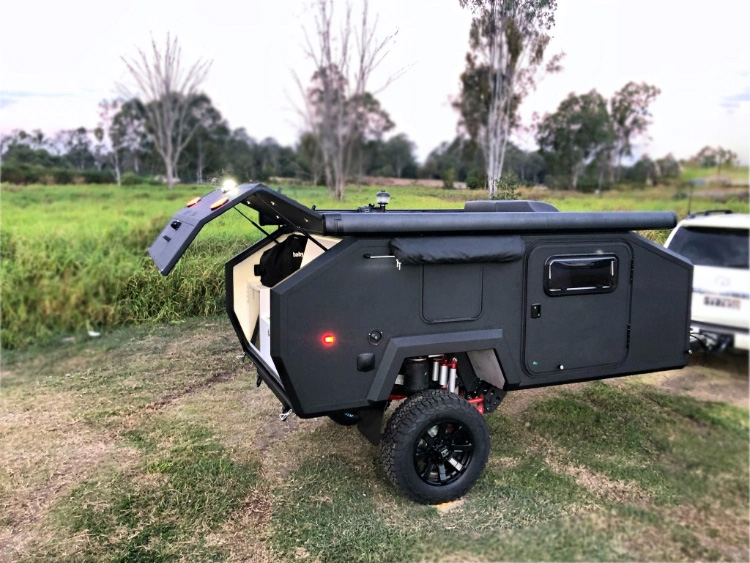
Are you planning a trip with your small car? Worried about finding the right trailer? Don’t stress—there are many choices made for you. Australia has lightweight and small trailers, including the Australian standard Travel Trailer, perfect for small cars. You can pick a tough off-road trailer or a cosy one. These are great for short weekend trips or adventures. Many mini camper trailers follow Australian safety rules, making them strong and safe.
Key Takeaways
Pick a trailer that suits your car's towing limit. Read your car manual to check GVM and GCM for safety.
Think about off-road use if visiting bumpy areas. Choose trailers with strong frames and tough suspensions for a better ride.
Go for a small trailer with useful features like storage and comfort. This makes trips easier and more fun.
Learn about Australian towing rules. Make sure your trailer has proper brakes and follows safety laws.
Take care of your trailer to keep it working well. Check tyres, brakes, and seals to avoid big repairs and stay safe.
Key Things to Think About When Picking a Travel Trailer
Weight and Towing Ability
When picking a trailer for your small car, weight matters. The trailer's weight must match your car's towing ability. This keeps your trip safe and smooth. Here's a simple table to explain the rules:
Rule | What It Means |
|---|---|
Car weight without trailer | Should be less than Gross Vehicle Mass (GVM). |
Car weight with trailer | Must stay under GVM when trailer is added (Trailer Ball Mass (TBM) counts as payload). |
Trailer weight | Should not go over Aggregate Trailer Mass (ATM). |
TBM | Should be about 10% of ATM. |
Rear axle weight | Must stay below the rear axle's weight limit. |
Total weight | Car and trailer together must be under Gross Combination Mass (GCM). |
To find towing limits, check your car's manual. It lists the GVM and GCM. These numbers show the heaviest load your car can pull.
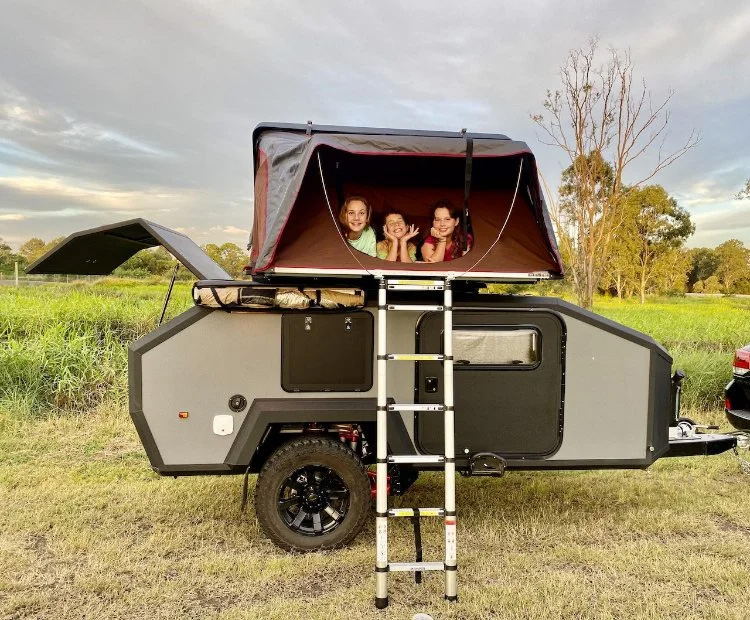
Off-Road Strength
If you want to explore rough areas in Australia, strength is key. Off-road trailers are made to handle tough conditions. They have strong frames, tough suspensions, and special tyres. These features help you drive on bumpy paths easily. Makers use strong materials and test them well. This ensures the trailers last long and work well.
Size and Features
Small cars need small trailers. Compact trailers are easy to tow but still useful. Look for trailers with bathrooms for comfort and privacy. Off-road features help you handle tough conditions. Strong designs make them practical and easy to use. Good storage keeps your things tidy and handy. This makes your trips more fun and stress-free.
Legal and Safety Requirements
Australian Towing Regulations
Before travelling with your travel trailer, know the towing rules. These rules keep everyone safe. Here’s what to remember:
Towing Capacity: Check your car manual for the towing limit. Never go over it. It’s unsafe and against the law.
Trailer Brakes: Trailers over 750 kg must have their own brakes.
Tow Bar Ratings: Your car’s tow bar must handle the trailer’s weight.
Number Plates and Lights: Trailers need a clear number plate and working lights. This includes indicators and brake lights.
Speed Limits: Some states have towing speed limits. Learn the rules for your area.
Tip: Keep your car manual and trailer papers with you. If stopped, you’ll have proof of legal towing.
Safety Tips for Towing Trailers
Towing can feel hard, especially for beginners. But don’t worry! Follow these tips to feel safer:
Distribute Weight Evenly: Place heavy items low and in the centre. This stops swaying.
Check Connections: Look at the tow hitch, chains, and wires before each trip.
Practice Turning and Reversing: Trailers make cars longer. Practise in open spaces to adjust.
Monitor Tyres: Check tyre pressure on both car and trailer. Proper pressure helps stability.
Drive Smoothly: Avoid sudden stops or sharp turns. Gentle moves keep the trailer steady.
Note: If the trailer sways, stay calm. Slow down gently and hold the wheel steady until it stops.
By following these tips and rules, your trip will be safer and more fun. Enjoy towing!
Top Travel Trailers for Small Cars in Australia
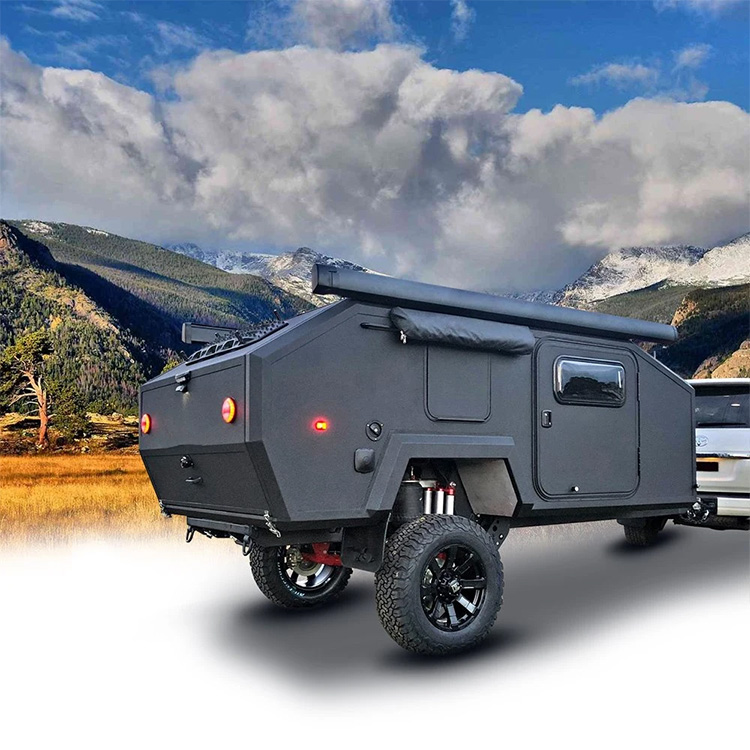
Lightweight Travel Trailers
Chase S5 Rear Fold Camper Trailer: Features, Pros, and Cons
The Chase S5 Rear Fold Camper Trailer is small and light. It’s easy to tow and quick to set up. This makes it great for short trips.
Features:
Rear-fold design saves space.
Lightweight, perfect for small cars.
Has a comfy bed and simple kitchen.
Pros:
Simple to tow and move around.
Fast to set up, saving time.
Made with strong materials for lasting use.
Cons:
Small storage space.
Not ideal for long holidays.
Road Warrior Campers: Features, Pros, and Cons
Road Warrior Campers are another lightweight option. They focus on being practical and comfy while staying light.
Features:
Small design with good aerodynamics.
Comes with a kitchenette and sleeping area.
Built tough for Australian roads.
Pros:
Cheap and easy to care for.
Great for people new to trailers.
Works well with small cars.
Cons:
Basic features may not suit luxury lovers.
Not great for rough off-road trips.
Off-Road Travel Trailers
Marlin Campers: Features, Pros, and Cons
Marlin Campers are made for adventure. They can handle Australia’s rough roads easily.
Features:
Heavy-duty suspension for bumpy roads.
All-terrain tyres for better grip.
Pros:
Ideal for off-road fans.
Strong build lasts a long time.
Handles tough conditions well.
Cons:
Heavier than lightweight trailers.
Costs more than smaller options.
Ultimate Campers Xscape: Features, Pros, and Cons
The Ultimate Campers Xscape is a fancy off-road trailer. It mixes comfort with toughness, perfect for adventurers.
Features:
High clearance for rough paths.
Big interior with modern features.
Weatherproof materials for all seasons.
Pros:
Stylish and practical design.
Great for off-road travel.
Good for long journeys.
Cons:
Costs more than other trailers.
Needs a car with strong towing power.
Budget-Friendly Options
OPUS Camper Trailers: Features, Pros, and Cons
OPUS Camper Trailers are known for smart designs and low prices. They’re a good pick for saving money.
Features:
Air beams for quick setup.
Compact but with good storage.
Comfortable areas for sleeping and eating.
Pros:
Easy to set up and pack away.
Reliable, as noted in Camper Trailer Australia Issue 157.
Affordable but still good quality.
Cons:
Not great for rough off-road use.
Smaller living space than bigger trailers.
Best Teardrop Campers: Features, Pros, and Cons
Teardrop campers are a popular choice for budget travellers. They’re small, stylish, and useful.
Features:
Teardrop shape for better wind flow.
Basic features like a bed and small kitchen.
Light and simple to tow.
Pros:
Cheap and saves fuel.
Great for short trips or solo travellers.
Highly praised in "Top Australian Camper Trailer Manufacturers To Watch In 2024".
Cons:
Too small for families.
Fewer features than bigger trailers.
Tip: If you’re new to trailers, try teardrop or pod campers. They’re easy to tow and care for, making them great for beginners.
Off-Road Capabilities of Travel Trailers
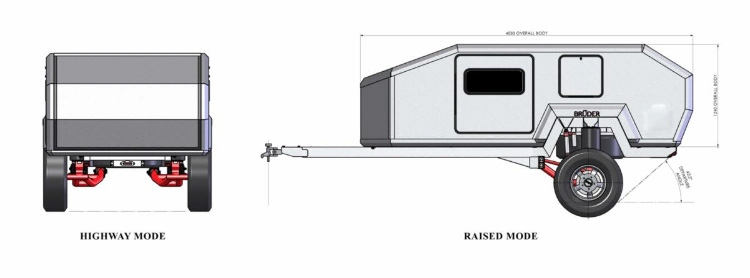
Suspension Systems
Comparing Independent Suspension and Leaf Springs
Suspension systems are key for smooth off-road rides. People often debate between independent suspension and leaf springs. Which one is better? Let’s compare them:
Opinion | Evidence |
|---|---|
Leaf Springs are cheaper and reliable | "For performance, cost and reliability fit some longer than normal leaf springs with an appropriate spring rate. There is absolutely no value in independent suspension on a trailer." |
Independent Suspension offers smoother rides | "Independent suspension every time...all the wheels & tyres remain vertical throughout their travel and therefore...gives a much smoother more controlled ride." |
More shock absorbers improve control | "Multiple large shock absorbers give greater control as they work easier and have a greater capacity to dissipate the generated heat." |
Leaf Springs are old-fashioned | "Leaf or semi-elliptic springs on campers and caravans are last century technology...most modern manufacturers use independent suspensions today." |
If you love off-road trips, independent suspension may suit you. It gives better control and smoother rides on sandy paths. But leaf springs are still affordable and dependable for many trailers.
Why Advanced Suspension is Useful
Advanced suspension systems help trailers handle rough roads better. They reduce shaking, protecting fragile items like electronics. Airbags let you adjust pressure for different loads, making trailers more stable. Heavy-duty suspension also stops damage from bumps. These features are great for Australia’s tough outback.
Ground Clearance and Tyres
Why High Ground Clearance Matters
High ground clearance helps trailers avoid hitting rocks or uneven paths. It keeps the trailer safe and working well. For wild adventures, good clearance makes travelling easier.
Best Tyres for Off-Roading
Tyres are important for off-road trips. All-terrain tyres grip well on sand and gravel. Mud-terrain tyres are better for wet or muddy areas. Always check your tyres before starting your journey.
Weather Resistance
Staying Safe in Australian Weather
Australia’s weather can be extreme. Your trailer must handle heat and rain. Choose trailers with weatherproof materials. UV-resistant coatings and rust-proof frames are helpful features.
Insulation and Waterproofing Benefits
Insulation keeps you comfy in hot or cold weather. Waterproofing stops rain from getting inside. Many trailers have sealed seams and strong fabrics to stay dry. These features keep your trailer cosy and ready for any weather.
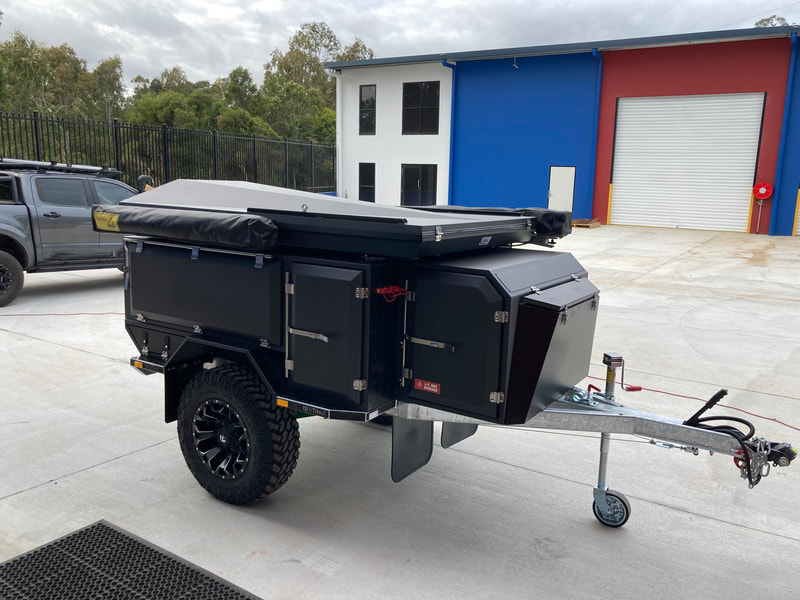
Budget and Value for Money
Price Ranges for Travel Trailers
Entry-level options
Starting out? Entry-level trailers are a smart pick. They’re cheap and have basic features like beds and small kitchens. These trailers are great for short trips or weekends away. Models like teardrop campers or pod trailers are light and simple to tow. They work well with small cars and suit travellers on a budget.
Mid-range and premium models
Want more comfort? Mid-range and premium trailers offer extra perks. They have bigger spaces, modern kitchens, and even bathrooms. Brands like Jayco and Avida RV are popular for their strong and stylish designs. Premium trailers can handle off-road trips, making them great for adventures. They cost more but are worth it for long-term use.
Evaluating Value for Money
Balancing cost with features and durability
It’s tricky to balance cost, features, and durability. Here’s what to check:
Pick trailers that mix comfort with usefulness.
Look for family-run brands that focus on value and practicality.
Towable RVs are easy to use and very flexible.
In Australia, more people are travelling locally, especially after the pandemic. Young travellers now enjoy camping and caravanning, increasing demand for strong and creative designs.
Aspect | Details |
|---|---|
Market Trends | Local travel is growing, boosting interest in trailers. |
Consumer Preferences | Buyers want durable and creative designs. |
Revenue Challenges | Sales are affected by supply issues and tight budgets. |
Popularity | Camping is becoming popular with younger people. |
Tips for finding deals and discounts
You don’t need to spend too much to get a good trailer. Try these tips:
Look for seasonal sales or special offers from makers.
Check second-hand trailers that are in good condition.
Compare prices online to find the best bargain.
Tip: Visit local dealers. They often have discounts or bundles with extras like tow bars or storage gear.
Maintenance and Long-Term Costs
Regular maintenance requirements
Taking care of your trailer keeps it working well. Check tyres, brakes, and suspension often to avoid big repair bills. Clean the outside to stop rust and check seals to keep it waterproof.
Cost considerations for repairs and upgrades
Fixing or upgrading trailers can cost money over time. Changing old tyres or adding better suspension for off-road trips can be pricey. But buying good parts makes your trailer last longer and saves money later.
Note: Plan for yearly servicing. It catches problems early, saves money, and keeps your trailer safe to use.
Picking the right travel trailer for your small car is important. Lightweight trailers like the Chase S5 are easy to tow. For off-road trips, the Ultimate Campers Xscape is a great choice. The best trailer should match your budget, weight limits, and needs.
Here’s a snapshot of Australia’s trailer industry:
Statistic | Value |
|---|---|
Industry revenue (2024) | |
Market size (2025) | $3.3 billion |
Number of businesses in the industry | 531 |
CAGR of businesses (2019-2024) | 2.2% |
CAGR of revenue (last 5 years) | -0.4% |
When choosing a trailer, think about these points:
Off-road features help with rough Australian roads.
Weight must suit your car’s towing ability.
Budget decides if you pick basic or fancy features.
Tip: Plan based on your travel needs. The right trailer makes trips easier and more fun.
FAQ
What is the best travel trailer for a small car?
The best trailer depends on what you need. Lightweight trailers like the Chase S5 are easy to tow. For off-road trips, the Ultimate Campers Xscape is strong and comfy.
Tip: Check your car’s towing limit before picking a trailer.
Can I tow a travel trailer with any small car?
Not all small cars can tow trailers. Look at your car’s manual for its towing limit. Lightweight trailers usually work, but going over the limit can harm your car or cause accidents.
Are off-road trailers worth the extra cost?
Off-road trailers are great for rough areas. They have better suspension, higher clearance, and are tougher. For city or highway trips, a regular trailer is enough.
How do I maintain my travel trailer?
Keep your trailer in good shape. Check tyres, brakes, and suspension before trips. Clean the outside to stop rust and check seals to keep it waterproof. A yearly service finds problems early.
Do I need a special licence to tow a trailer in Australia?
You don’t need a special licence if your car and trailer follow weight rules. But you must obey towing laws, like speed limits and brake rules.
Note: Always carry your car’s manual and trailer papers when travelling.
